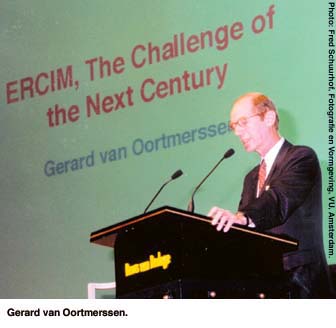Gerard van Oortmerssen, Director of CWI, President of ERCIM
ERCIM: the Challenge of the Next Century

Our time is characterized by change, which takes place at an ever increasing speed. The most recent example is the Internet and World Wide Web. Only five years ago, few outside academia had heard about it. Now it is expected that within five more years, one billion people will be connected to the Internet, and one billion people will possess a mobile phone, probably with a web browser on it. Of course, we have to be careful with this kind of extrapolation based predictions. Technology forecasts are often falsified by history. Often, but not always. More than 50 years ago, the French Jesuit and paleontologist Pierre Theillard de Chardin predicted the emergence of a world encompassing network of conscience, which he called noosphere, as a next step, actually a discontinuity in the process of evolution of mankind. I believe we are witnesses of his vision becoming reality right now.
The digital revolution pervades all areas of our existence. It creates a new economy, in which the raw material — information — can be shared. A nice example of this is open source software or shareware, like the Linux operating system. But this phenomenon also raises new questions. For example, how can we protect our intellectual property when it’s so easy to copy and distribute information? Maybe we need an entirely new system of values in the new economy.
The digital revolution also has its negative effects, which should not escape our attention. The information society is vulnerable to faulty software (millennium bug) and to people with bad intentions (computer viruses, hackers). There is the danger of a gap between the haves and the have-nots. Groups such as the elderly should have access to information as easily as anybody else. People who work long hours with keyboard and mouse frequently develop repetitive strain injury. And some people talk already about info stress, caused by the difficulty to find in the information jungle the relevant parts.
The research community, faced with all these dazzling developments which it had caused itself to a large extent, had to take action in order to deal adequately with the rapid changes. Ten years ago, after the Single European Act, the initiative to establish ERCIM was taken by Alain Bensoussan, Gerhard Seegmüller and Cor Baayen. They were at that time the directors of INRIA in France, GMD in Germany and CWI in The Netherlands. The founders were convinced that they would improve their ability to satisfy the demands of the changing environment by combining their efforts and complementing each other’s fields of research. ERCIM has now 14 members, from all over Europe, including countries from Eastern Europe. The 15th member, Trinity College in Dublin, is expected to join before long.
The Working Groups are the core of ERCIM’s activity. The objective of a Working Group is to build and maintain a network of ERCIM researchers in a particular scientific field. At present, there are twelve Working Groups. Two successful examples are the Digital Library Initiative, which created the ERCIM technical reference digital library service and set up collaboration with the National Science Foundation in the US, and the World Wide Web Working Group, which coordinates ERCIM’s activities in the further development of web technology in the framework of the World Wide Web Consortium (W3C).
ERCIM’s international role is growing, also outside Europe, as can be witnessed from a recently obtained contract from the EU to identify the potential research areas, priorities and partners in South America for projects in the Information Society Technologies programme. A similar contract was obtained just now to organize workshops jointly with the National Science Foundation in the United States in order to promote US participation in the 5th Framework Programme. This means that ERCIM is now recognized by the European Commission as a point of contact for European ICT research. ERCIM faces the future with confidence, and is ready to meet the challenges of the next century.
